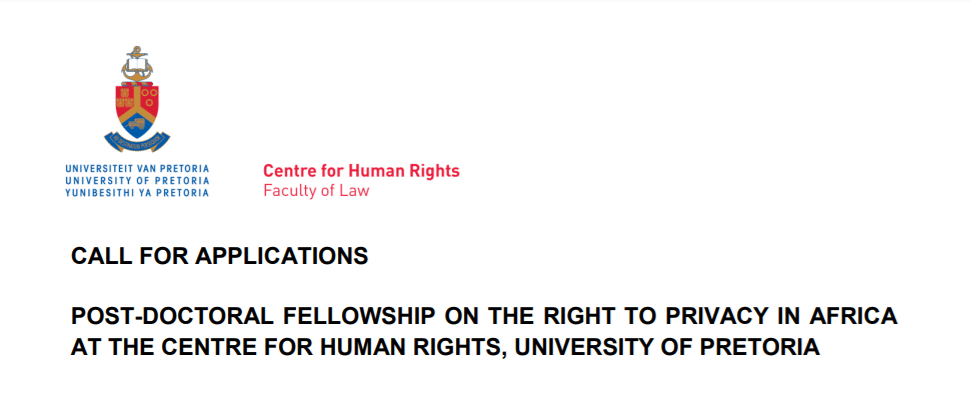Post-Doctoral Fellowship on the Right to Privacy in Africa 2022: The Centre for Human Rights, Faculty of Law, University of Pretoria (Centre) invites applications for a one-year post-doctoral fellowship focused on research and policy with respect to the right to privacy in the digital age in Africa, based at the Centre in Pretoria.
Table of Contents
When is the Application Deadline:
3rd December 2021.
Tell Me About Post-Doctoral Fellowship on the Right to Privacy in Africa:
Despite the omission of the right to privacy from the African Charter on Human and Peoples’ Rights (African Charter), the African Union’s human rights system has made efforts to protect the right. For example, when the African Commission on Human and Peoples’ Rights in 2019 revised the Declaration of Principles of Freedom of Expression and Access to Information in Africa, it made elaborate provisions on how States must protect not only the right to privacy but also its other aspects in the digital age like communication surveillance and protection of personal information. This shows that the right to privacy, whether offline or online, is not alien to the African system and in particular, its human rights system.
In the context of the digital age, the various aspects of privacy constantly become more complex as a result of digital technologies. For example, frontier technologies like Artificial Intelligence (AI), Internet of Things (IoTs), now have huge impacts on the collection and use of personal information.
Governments also have more access to personal information of private citizens just as businesses are also beginning to drive their objectives solely by drawing predictive analytics from vast amounts of data. More than ever before, there is a need to have comprehensive data governance systems that not only define responsibilities for various stakeholders but also provide avenues for effective redress mechanisms for various human rights violations. These developments call for the right to privacy to be rethought and repositioned – also in Africa.
These factors point to the need to not only rethink approaches to regulation of personal information within the African human rights system, but also to conduct rigorous and independent research that can lead to impactful policy interventions in many of the areas that privacy and data protection intersect with.
Responsibilities
The post-doctoral fellow will be hosted by the Expression, Information and Digital Rights Unit of the Centre. The major responsibilities of the fellow are to:
a. Carry out research in areas that may intersect with the right to privacy and data protection especially in the digital age within the African context. Such areas may include:
● Operationalisation of national legal frameworks
● Communication surveillance
● Biometrics
● Governments’ access to personal information
● Businesses, privacy and personal information
● Elections
● Socio-economic rights
● Proliferation of surveillance technology and international law International trade and surveillance equipment
● African human rights institutions
● Public policy formation and development
● Gender equity
● Minority groups
b. Work together with major stakeholders within the African Union’s human rights system on the promotion of the right to privacy to produce research-backed policy formation.
c. Produce a direct, measurable and impactful output before the end of the fellowship on the right to privacy in the digital age in Africa.
d. Collaborate to carry out a series of activities like stakeholder convenings, workshops or seminars that could lead to a book, a larger research workshop or collaboration with specific institutions within the African human rights system on a specific intersecting aspect of the right to privacy in the digital age.
e. Contribute to reports from donors with respect to the project.
f. Play a leadership/managerial role in the Expression, Information and Digital Rights Unit.
Take on any other responsibilities as may be determined by the Director of the Centre.
What Type of Scholarship is this?
Postdoctorate
Who can apply?
Required qualifications
The prospective candidate must:
a. Hold a doctorate degree in the field of law, human rights or related disciplines obtained in the last five years.
b. Have at least five years’ experience working within an academic, civil society institution or an international organisation on issues relating to the impacts of digital technologies and human rights.
c. Have a demonstrable research record on the impacts of digital technologies on human rights in the digital age. Publication(s) that focus on the right to privacy in the digital age is a plus.
d. Have an advanced and demonstrable knowledge of the African human rights system.
e. Have experience with project coordination, management and execution.
f. Have strong interpersonal communication skills.
g. Have an excellent command of the English language.
Desirable qualifications
Candidates with the following qualifications will have an added advantage:
a. Fluency in any additional African Union language (Arabic, French, Portuguese, Kiswahili).
b. Have a demonstrable research record on policy development and formation at regional, subregional or national levels.
c. Experience of working in African countries.
d. Having a permit or other status that allows them to work in South Africa.
Which Countries are Eligible?
African countries
Where will Award be Taken?
South Africa
How Many Scholarships will be Given?
Not specified
What is the Benefit of Post-Doctoral Fellowship on the Right to Privacy in Africa?
The successful applicant must be able to start on 1 February 2022, or as soon as possible thereafter. A monthly stipend of R 25 000 is paid, as well as a monthly contribution of R 6000 to accommodation and R 15,000 relocation, if required. The initial period for the fellowship is for one year. It may be renewable, subject to availability of funds and satisfactory performance. The duty station is the Centre for Human Rights, Faculty of Law, University of Pretoria or, exceptionally, any other remote location as may be agreed upon.
How Long will the Program Last?
4 years
How to Apply for Post-Doctoral Fellowship on the Right to Privacy in Africa:
Apply below
Visit Award Webpage for Details











